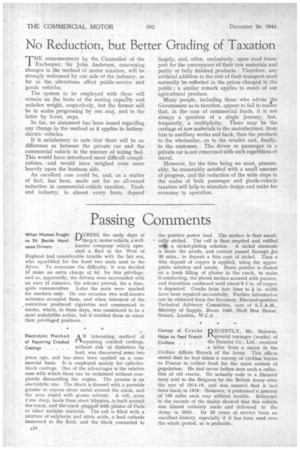No Reduction, but Better Grading of Taxation T HE announcement by
Page 18

If you've noticed an error in this article please click here to report it so we can fix it.
the Chancellor of the Exchequer, Sir John Anderson, concerning . changes in the method of motor taxation, will be strongly welcomed by our side of the industry, so far as the alterations affect public-service and goads vehicles.
The system to be employed with these will remain on the basis of the seating capaCity and unladen weight, respectively, but the former will be in scales progressing by one seat, and in the latter by 5-cwt. steps.
So far, no statement has been issued regarding any change in the method as it applies to batteryelectric vehicles.
It is satisfactory to note that there will be no difference as between the private car and the commercial vehicle in the manner of taxing fuel. This would have introduced most difficult complications, and would have weighed even more heavily upon the business side.
An excellent case could be, and, as a matter of fact, has been, made out for an all-round reduction in commercial-vehicle taxation. Trade and industry, in almost every form, depend largely, and, often, exclusively, upon road transport for the conveyance of their raw materials and partly or fully finished products. Therefore, any artificial addition to the cost of their transport must naturally be reflected in the prices charged to the public ; a similar remark applies to much of our agricultural produce.
Many people, including those who advise the Government as to taxation, appear to fail to realize that, in the case of commercial loads, it is not always a question of a single journey, but, frequently, .a multiplicity. There may be the carriage of raw materials to the manufacturer, from him to ancillary works and back, then the products to the wholesaler, on to the retailer and, finally, to the customer. The driver or passenger in a private car is not concerned with such repetitions of travel.
However, for the time being we must, presumably, be reasonably satisfied with a small amount of progress, and the reduction of the wide steps in the scales of both passenger and goods-vehicle taxation will help to stimulate design and make for economy in operation.




















































